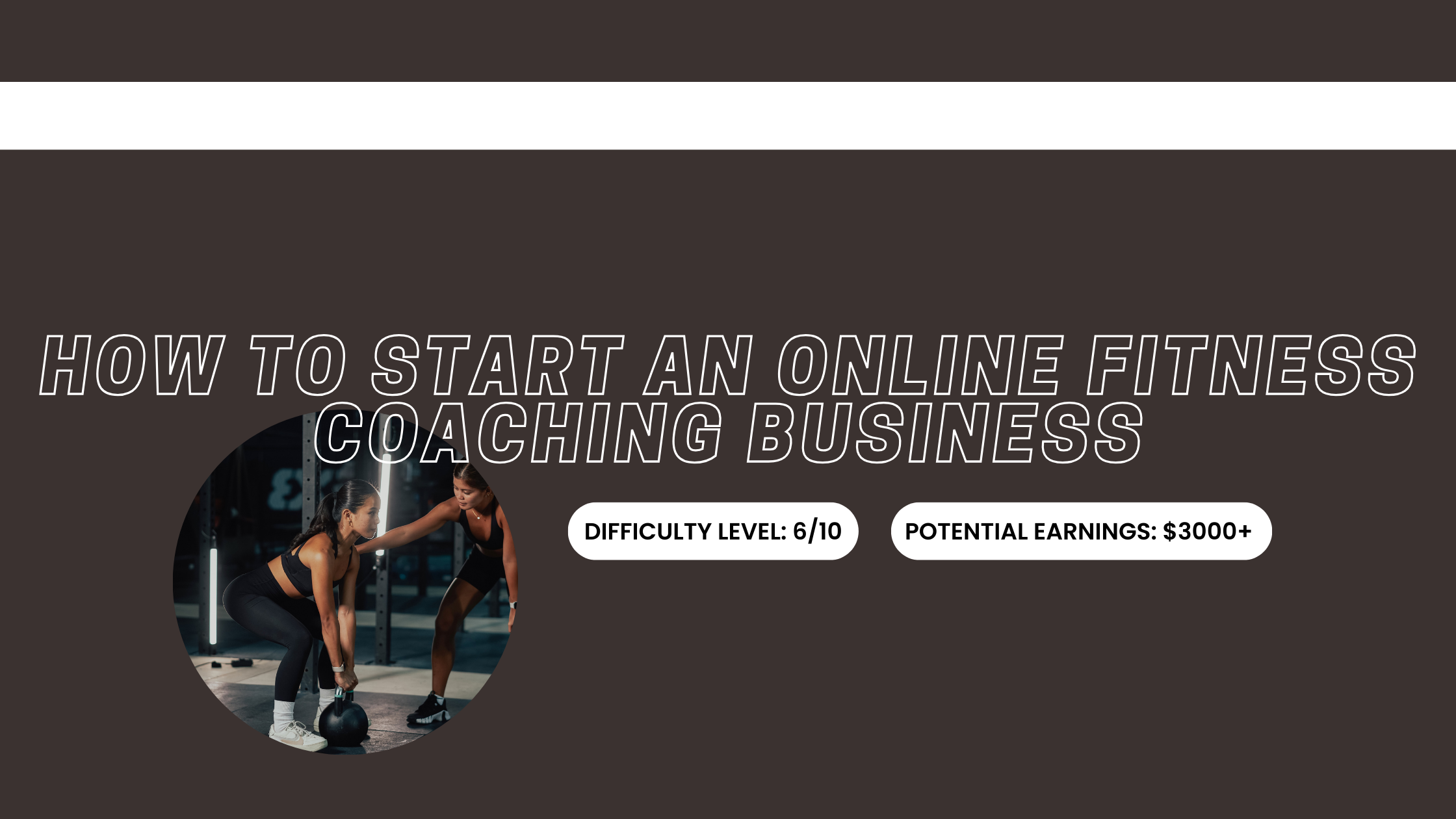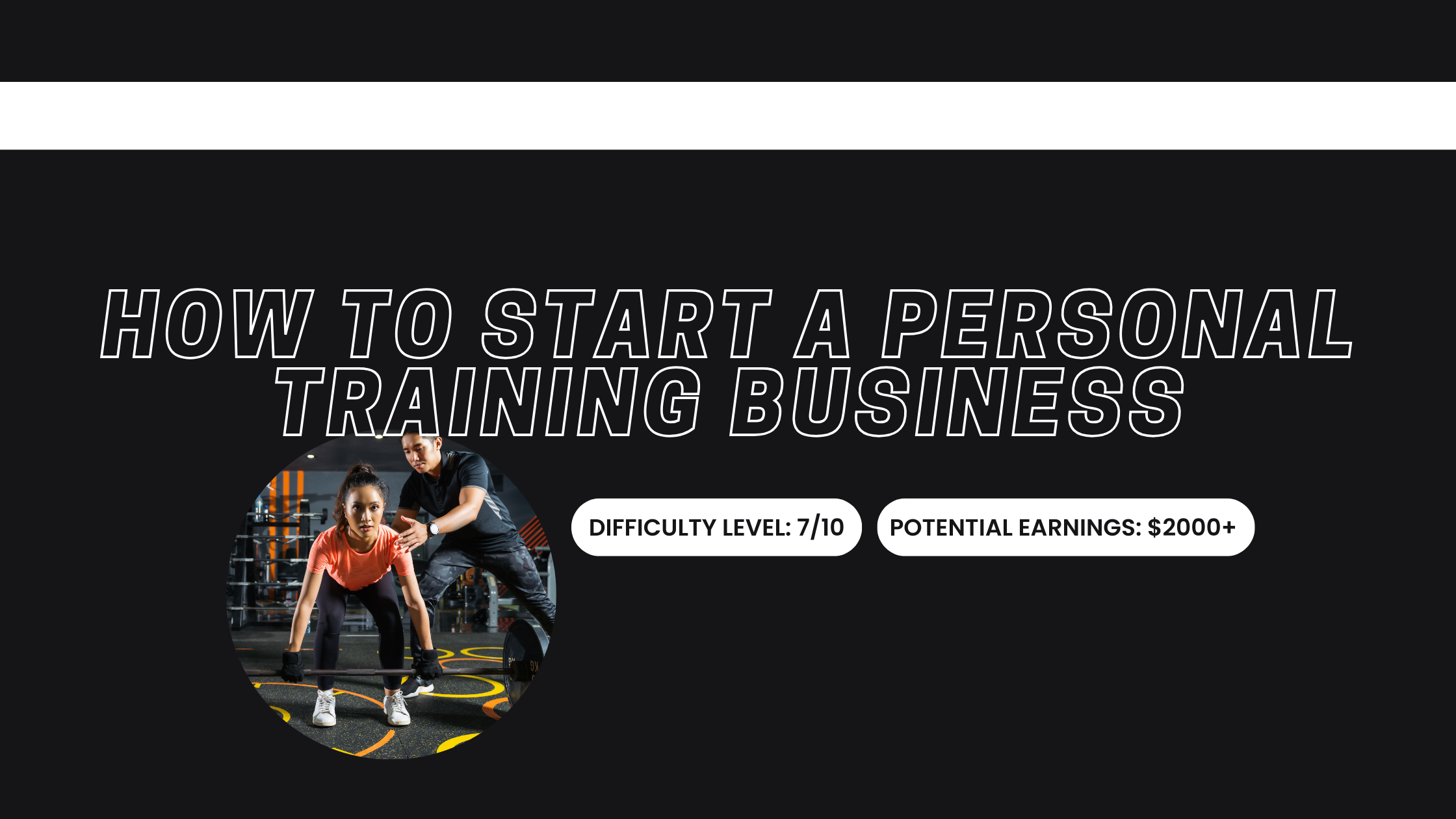How to Start a Successful Personal Training Business
Time & Money
How Hard
7/10
Weekly Time Commitment
20-25 hours
Earnings Per Month
$2,000 - $10,000
Is This Side Gig For Me?
Fitness enthusiasts who enjoy helping others reach their health goals may find a passion in personal training. If you like exercise, nutrition & people-motivating gigs, this could be your calling. It isn't for the faint of heart or those who like a predictable 9-to-5 routine though. Patience, excellent communication, and the ability to adapt to client needs are essential. If you aren't a morning person or you hate working evenings and weekends, you might want to bench press this idea and find another side hustle.
Preparation
There are a few steps you need to take before you start flexing your entrepreneurial muscles. First, get certified first with NASM, ACE or ISSA - it's not about looking good on paper - it's about training clients safely and effectively. Next, choose your niche. Will you be the go-to trainer for weight loss, strength training, or pre/postnatal fitness? Once you decide on a niche, create a business plan outlining your services, pricing structure and marketing strategy. And most importantly, get liability insurance. Accidents happen, and you do not want a dropped dumbbell to ruin your dreams. Invest in robust gym equipment, and get CPR and first aid certified. Finally, create an online presence with a professional website and social media accounts. And remember - in personal training, your body is your business card - so walk the walk and get in shape yourself.
Execution
Define Your Unique Selling Proposition
You need to stand out among a sea of personal trainers to succeed. So why are you special? Maybe you train busy executives or you are the 'Ninja Warrior' of obstacle course training. Whatever it is - create your unique selling proposition and build on it. From your marketing materials to how you conduct your sessions, your USP should be reflected in every aspect of your business design. Remember that you're selling more than just workouts - you're selling a transformation, an experience and maybe a little bit of that post-workout pain that people secretly love.Build Your Client Base
Now it's time to flex those networking muscles. Start by offering free sessions to friends, family, and local influencers in exchange for testimonials and referrals. Leverage social media to showcase your expertise - post workout tips, transformation stories, and maybe the occasional gym fail for good measure. Collaborate with local businesses like health food stores or yoga studios to cross-promote services. Don't be afraid to pound the pavement (literally) - attend local events, join fitness meetups, and always have your business cards handy. Remember, every person you meet is a potential client or knows someone who could be. And hey, if all else fails, you can always stand outside a bakery and hand out your cards - just kidding, please don't do that.Create Killer Workout Programs
Your workout programs should be as well-structured as your client's newly developed six-pack. Tailor each program to your client's goals, fitness level, and preferences. Mix it up with a combination of strength training, cardio, and flexibility work. Don't forget to include progressive overload - your clients should be constantly challenged, but not so much that they can't walk the next day (unless that's their thing). Use technology to your advantage - there are plenty of apps that can help you design and track workouts. Remember to educate your clients about proper form and the science behind the exercises. The more they understand, the more invested they'll be in the process. And please, for the love of all things holy, come up with more creative exercise names than 'burpee' - I mean, who wants to do something that sounds like it belongs in a baby care manual?Provide Exceptional Customer Service
Customer service is more than being nice - it's being a cheerleader, therapist, and sometimes a drill sergeant too in the personal training business. Be on time, prepared, and professional for every session. Be sensitive to client concerns & adjust your approach accordingly. Celebrate their wins, no matter how small - did they choose salad over fries? You deserve a high five for that one! Follow up with clients between sessions to check in and offer support. Build out a client community through group challenges or a private Facebook group. Remember - you're selling a lifestyle change, not just an hour of your time. And if a client tells you they hate burpees, take it personally - everyone hates burpees.Expand Your Services
Once your client base is built, you can begin expanding your empire. But how do you ramp up quickly? It takes creativity. Give online sessions a try for clients who can not meet in person or who live in other time zones. Nothing says dedication like a 3 AM workout. Sell workout plans/nutrition guides. Hold fitness or retreat classes. Partner with other health professionals like nutritionists or physiotherapists to offer wellness packages. Every good private trainer business plan has strategies for hosting workshops or producing branded goods. Create your own line of fitness wear or equipment - just don't call it SweatGear or something equally grotesque. The trick is balancing those different income streams while remaining true to your brand and expertise.
Bumps In The Road
Dealing with Inconsistent Client Schedules
Problems for personal trainers include dealing with clients who view their workout as a suggestion and not a commitment. You might get more late cancellations than a dentist's office on Halloween. A clear cancellation policy can prevent this. Consider charging for no-shows or late cancellations. Incentivize attendance - offer free sessions after a certain number of workouts. Flex when you can, but teach your clients about consistency in reaching fitness goals as well. And if that client keeps standing you up - there are plenty of other fish in the sea ready to take your programme on.Managing Unrealistic Client Expectations
All of us have seen those 'Get Shredded in 30 Days!' ads, and unfortunately some clients just believe them. Managing expectations will keep your clients from being disappointed - and you sane! Start by setting a realistic timeframe. Instruct your clientele about the science of fitness & the need for long term changes. Set realistic goals with measurable milestones and celebrate little wins along the way. If a client insists on losing 50 pounds a month, explain that it's not healthy or sustainable - unless they plan on removing a limb. Your job is to steer them toward health, not impossible fantasies.Coping with Seasonal Fluctuations
The personal training business can be as unpredictable as the weather - busy seasons (hello, New Year's resolutions!) and slow periods (hello, holiday season). To weather these storms, diversify your services. Offer online training or create workout programs clients can do at home during busier times. Slower periods are ideal for marketing, professional development, or creating content for your social media channels. Partner with local businesses for seasonal promotions - nothing says summer more than a smoothie shop joint venture. And like your clients' fitness journeys, your business will have its ups and downs too. The key is staying consistent, adapting to changes and moving forward.
Continue Learning

Meal Prep Service
Starting a meal prep service involves creating healthy, convenient meals that cater to your target audience’s dietary needs.

Online Fitness Coaching
Starting an online fitness coaching business begins with identifying your niche—whether it's weight loss, strength training, or sports performance.

Nutrition Coaching
Starting a nutrition coaching business involves combining your passion for healthy living with the knowledge to guide others.
